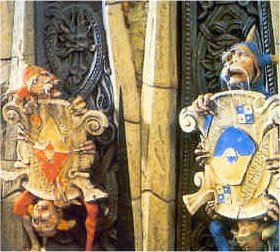 Don’t ask me how exactly this happened, but in a cabin on a mountain over the weekend we got ourselves into the classic Liar-Truth Teller Enigma, later embellished by the brilliant logician Raymond Smullyan. It’s an old logic puzzle, which runs, basically, something like this. A man finds himself standing in front of two doors: one which leads to heaven and the other which leads to hell. In front of the doors are two guards, one which always lies and the other which always tells the truth. The man does not know which door is which, nor which guard is which. He must ask one question of one of the guards to determine which door will lead him to heaven.
Don’t ask me how exactly this happened, but in a cabin on a mountain over the weekend we got ourselves into the classic Liar-Truth Teller Enigma, later embellished by the brilliant logician Raymond Smullyan. It’s an old logic puzzle, which runs, basically, something like this. A man finds himself standing in front of two doors: one which leads to heaven and the other which leads to hell. In front of the doors are two guards, one which always lies and the other which always tells the truth. The man does not know which door is which, nor which guard is which. He must ask one question of one of the guards to determine which door will lead him to heaven.
You may recognise the puzzle from its use in The Labyrinth (1986) starring David Bowie and Jennifer Connelly (a film we later rented). After a couple of hours of testing it out using live liars and truth-tellers in front of two bookshelves (both of which led precisely nowhere), the keen examinees gave their answer: “Guard, what would the other guard say if I asked him where his door leads?” Whatever the reply is, the opposite is true. Why? Well, let’s say the door behind Guard A leads to heaven. If Guard A is a liar, then he will lie and say that Guard B would say his door leads to heaven. If, however, Guard A is the truth-teller then he will report that Guard B would say his door leads to heaven; and in this case Guard A is faithfully reporting the fact that Guard B will lie. Either way we have the same answer, and the opposite is true. In both cases the liar is involved in the answer and the answer is always false.
For other logic puzzles, click here. For the Hardest Logic Puzzle Ever, keep reading…
L’indovinello più difficile del mondo
by George Boolos (1992)
Three gods A, B, and C are called, in some order, True, False, and Random. True always speaks truly, False always speaks falsely, but whether Random speaks truly or falsely is a completely random matter. Your task is to determine the identities of A, B, and C by asking three yes-no questions; each question must be put to exactly one god. The gods understand English, but will answer all questions in their own language, in which the words for yes and no are ‘da’ and ‘ja’, in some order. You do not know which word means which.
It could be that some god gets asked more than one question (and hence that some god is not asked any question at all). What the second question is, and to which god it is put, may depend on the answer to the first question. (And of course similarly for the third question.) Whether Random speaks truly or not should be thought of as depending on the flip of a coin hidden in his brain: if the coin comes down heads, he speaks truly; if tails, falsely. Random will answer ‘da’ or ‘ja’ when asked any yes-no question.
There are many more variables involved in this one, so good luck. If you can’t be arsed trying, click here and scroll for the solution. (Next time I go to the mountains I’ll take a copy of the National Enquirer.)

